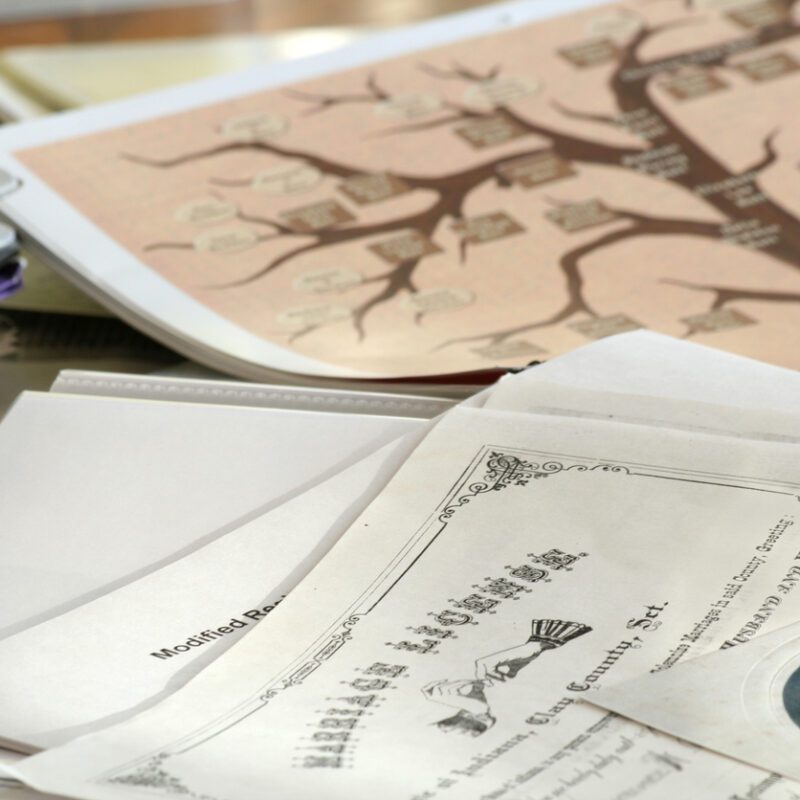Genealogy has gained significant popularity in the UK, spurred by TV programs like Who Do You Think You Are? and the increasing availability of online records. Many individuals explore their ancestry as a hobby, tracing their family roots over generations. However, there is a clear distinction between hobbyist genealogists and professionals who offer their services to the public or the legal sector. This article outlines the key differences between professional genealogists and hobbyists in the UK, focusing on their qualifications, skills, and the services they provide.
Qualifications and Training
Professional Genealogists: In the UK, professional genealogists often have formal qualifications, training, and certifications that set them apart from hobbyists. Many undertake courses through reputable institutions that provide extensive training in genealogical research methodologies, standards, and ethics.
Professionals may also hold certifications from organisations like the Association of Genealogists and Researchers in Archives (AGRA), demonstrating a high level of expertise and adherence to recognised standards of practice.
Additionally, genealogy is a full-time occupation for many professionals, with expertise sharpened by years of experience. Having solved numerous cases, professionals bring a wealth of knowledge to complex genealogical challenges.
Hobbyists: Hobbyists, by contrast, may lack formal training or qualifications, gaining knowledge through experience, self-study, online courses, or workshops. While they may be passionate and skilled in specific areas of research, hobbyists do not typically undergo the same rigorous training or certification as professionals. Their expertise may be more focused on particular local records or surname studies, but it often lacks the breadth and depth seen in professional genealogists.
Research Skills and Methodologies
Professional Genealogists: Professionals are trained in advanced research techniques, working with a wide range of sources like parish records, wills, land deeds, military documents, and archives. They possess the skills to analyse and interpret historical documents and navigate complex record systems, including those at the National Archives and local repositories. Professionals also have access to restricted records due to data protection laws, providing them with more comprehensive data for their research.
A fundamental part of professional genealogy is adhering to the Genealogical Proof Standard (GPS), ensuring that every family connection is supported by credible evidence. This level of accuracy and documentation is key to producing reliable family trees.
Hobbyists: Hobbyist genealogists tend to rely more heavily on online platforms like Ancestry.co.uk and Findmypast. While these resources are invaluable, hobbyists may not have the same access to physical archives and specialist collections as professionals do, limiting their research scope to what’s available digitally.
Although many hobbyists develop excellent research skills, they may not always follow formal genealogical standards. This can result in casual research methods and less meticulous documentation, leading to errors or inaccurate family connections.
Ethical Standards and Code of Conduct
Professional Genealogists: In the UK, professional genealogists adhere to strict ethical standards. Organisations like the International Association of Professional Probate Researchers (IAPPR) enforce a Code of Conduct, ensuring that professionals work with integrity, confidentiality, and transparency. This is especially important when dealing with sensitive family history information, such as cases of adoption or criminal records.
A professional’s reputation is closely tied to the accuracy of their work, and they are required to disclose any limitations in their findings. Most professionals also carry public liability and, in some cases, professional indemnity insurance to protect themselves and their clients in case of disputes.
Hobbyists: Hobbyists are not bound by formal ethical guidelines. They may share family history information more freely, often posting on public websites or social media without the same considerations for privacy or accuracy. While most hobbyists aim to be ethical in their work, the lack of oversight can sometimes result in privacy concerns or the dissemination of unverified information.
Services and Client Relationships
Professional Genealogists: Professional genealogists offer a broad range of services, including probate research, DNA analysis, heir tracing, and document transcription. Many professionals also act as expert witnesses in legal cases or help trace missing relatives. For those working on intestacy cases, professionals handle the entire estate process, from obtaining necessary documents to distributing assets to identified heirs.
Professionals build strong relationships with their clients, offering regular updates and clear, detailed reports to ensure transparency and accuracy in their findings.
Hobbyists: Hobbyists typically focus on researching their own family history or helping friends and relatives informally. While some may offer assistance to others, their work is often done on a non-commercial basis and lacks the comprehensive services offered by professionals. They may not have the same access to records, and their research tends to be more personal than formal.
Hobbyists rarely produce formal reports, as their work is usually for personal interest rather than a professional service. However, many contribute to the genealogical community by volunteering with local societies or participating in transcription projects.
Costs and Financial Considerations
Professional Genealogists: Professional genealogists charge fees for their services, which vary based on the complexity of the research and the expertise required. These fees often include not only the genealogist’s time but also the costs of accessing specialised resources and managing the administrative side of probate and estate cases.
Hobbyists: For hobbyists, genealogy is primarily a personal passion, and they do not typically charge for their services. While they may spend money on subscriptions to databases or travel for research, hobbyist genealogy remains a more affordable, albeit less in-depth, alternative to hiring a professional.
Conclusion
The distinction between professional genealogists and hobbyists in the UK is evident in their qualifications, research methods, ethical standards, and services. Both play valuable roles in the field of genealogy, but professionals offer a higher level of expertise, accuracy, and accountability. For those needing specialised or in-depth research, especially in complex legal matters like intestacy, hiring a professional genealogist is often the best choice.
 Callum Emmerson
Callum Emmerson